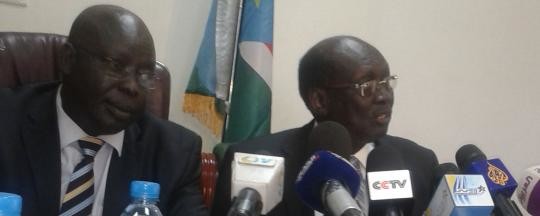Dozens of Ugandan civil servants arrived to South Sudan’s capital Juba this week as part of an inter-governmental cooperation program that aims to place 139 East African civil servants into South Sudanese institutions.
The initiative is a regional cooperation project through which the IGAD countries of Ethiopia, Kenya and Uganda aim to help South Sudan boost its civil service. The recent arrivals are part of the second phase of the project, following earlier deployments in previous years.
Ngor Kolong Ngor, South Sudan’s Minister of Labour and Public Services, received the first batch of the support officers on Tuesday at Juba International Airport, welcoming them and saying that they will provide mentoring support to South Sudanese counterparts for two years.
“We as the government of South Sudan welcome them to work with our staff and are ready to provide necessary support for the next two years of their stay here in South Sudan,” Ngor said.
The first batch of the Civil Service Support Officers from Uganda includes medical and laboratory specialists, ICT specialists, economic and trade specialists and others.
The minister said the Ugandan civil servants will assist in institutions including the ministries of health, finance, agriculture, the HIV/AIDs commission, and audit chamber. He explained that the government is also expecting more civil service officers to arrive from Ethiopia and Kenya in the coming months.
Balazs Horvath, UNDP Country Director, said the project is a partnership between South Sudan’s government, IGAD countries, Norway and the UNDP since 2011. He added that 200 civil service support officers worked in the country during ‘phase one,’ providing on-the-job training for their South Sudan counterparts through mentoring and coaching.
“Norway funds the project. It is over 20 million dollars over a period of two years,” he said.
Horvath further disclosed that the civil servants will be deployed at first in only seven states owing to conflict in three of the country’s ten states. After peace comes, more civil service officers may be deployed in the other states, he said.
The UNDP official said that the 139 civil service support officers will be deployed to 16 institutions at the national, state and county levels with 60 percent of the deployment targeting policy and technical needs in peacebuilding, agriculture, health and education.
Ngor Kulang (on left). (File photo, Radio Tamazuj)




